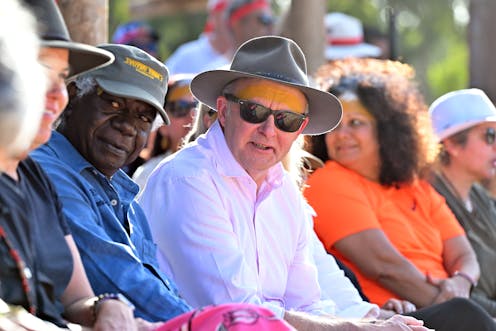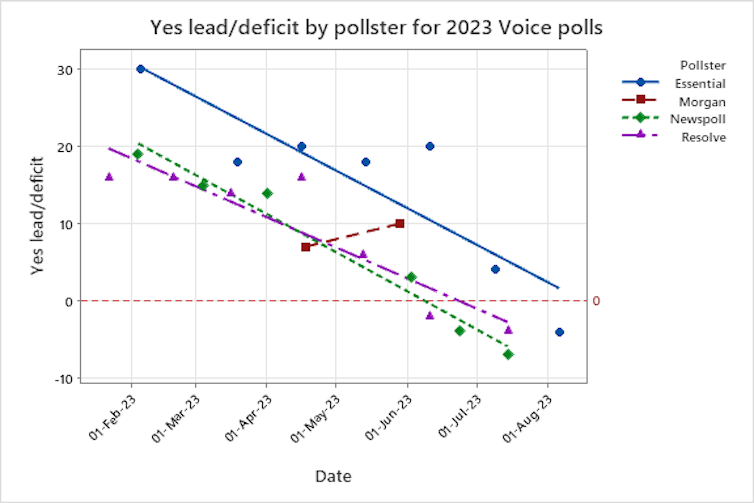
A national Essential poll, conducted August 2–6 from a sample of 1,150, gave “no” to the Indigenous Voice to parliament a 47–43 lead, reversing a 47–43 lead for “yes” in this poll in early July. While Newspoll and Resolve polls had given “no” a lead in June, this is the first time “no” has led in Essential.
Here is an updated graph that I first published in July of Voice polls from Essential, Newspoll, Resolve and Morgan (which hasn’t conducted a Voice poll since May). It’s bleak for the Voice that Essential, clearly the most favourable pollster for “yes”, now has “no” ahead.

In more bad news for the Voice, a Redbridge national Voice poll, conducted July 21–27 from a sample of 1,022, had “no” leading by 56–44 in a forced choice question. The Essential poll had hard “no” leading hard “yes” by 38–31.
Labor’s voting intention lead increases in Essential
In Essential’s two party measure that includes undecided, Labor led by 52–42, an increased margin from a 50–45 lead last fortnight. Primary votes were 33% Labor (up two), 30% Coalition (down two), 12% Greens (down two), 8% One Nation (up one), 2% UAP (up one), 8% for all Others (down one) and 6% undecided (steady).
Respondent allocated preferences appear to have increased Labor’s lead, with Labor’s gain on primary votes compensated by a fall for the Greens, while the Coalition’s losses were gains for One Nation and UAP.
This term Essential polls have been better for the Greens than other polls. This is the Greens’ equal lowest primary vote in Essential, tying 12% in March.
Respondents were asked to rate the government’s performance on various issues on a five-point scale going from excellent to poor. The government received its worst ratings for cost of living (44% poor) and housing affordability (38% poor). By 67–26, respondents thought the government could make a meaningful difference to the cost of living.
On sports betting, 43% (steady since May) wanted sports betting advertising banned outright, 25% (down one) said it should be allowed, but not during sports events and 16% (steady) said it should always be allowed.
By 50–26, respondents agreed that marijuana should be taxed and regulated like alcohol and tobacco, but they disagreed on other currently illegal drugs, in most cases with over 50% disagreeing.
Morgan poll and seat entitlements
In this week’s Morgan weekly federal poll, conducted July 31 to August 6 from a sample of 1,391, Labor led by 53.5–46.5, a 0.5-point gain for Labor since the previous week. After four successive moves to the Coalition had reduced Labor’s lead from 57–43 to 52–48, Labor has made two successive gains. Primary votes were 35% Coalition, 33.5% Labor, 13% Greens and 18.5% for all Others.
On July 27, the Australian Electoral Commission announced that the House of Representatives would drop from 151 to 150 seats at the next election, with Western Australia gaining a seat and Victoria and New South Wales each losing one. I covered this in June when the latest population statistics were released.
Read more: Woeful Victorian poll for state Coalition; Victoria and NSW to lose federal seats as WA gains
Labor holds WA Rockingham byelection easily despite huge swing to Libs
At the July 29 byelection for former WA Labor premier Mark McGowan’s seat of Rockingham, Labor defeated the Liberals by 65.2–34.8, a huge 22.5% swing to the Liberals since the 2021 WA election. Primary votes were 49.4% Labor (down 33.5%), 17.7% Liberals (up 7.8%), 15.9% for independent Hayley Edwards (new), 6.8% Legalise Cannabis (new) and 4.9% Greens (up 1.8%).
On the distribution of preferences, Edwards overtook the Liberals as minor candidates were excluded, and the seat finished as a contest between Labor and Edwards, with Labor winning by 61.4–38.6.
While this was a huge swing, there are extenuating circumstances for Labor. The 2021 WA election was a record landslide for a state or federal Australian election, with Labor winning the statewide two party vote by 69.7–30.3 on a primary vote of 59.9%. It’s reasonable to expect a big swing against Labor from these levels.
When an MP retires, the party loses that MP’s personal vote. McGowan was very popular, and his seat was the strongest for Labor at the 2021 election partly owing to his popularity. The loss of such a popular MP enhanced the swing against Labor.
Analyst Kevin Bonham said Labor’s two party percentage in Rockingham at this byelection exceeded Rockingham results at three general elections that Labor won with an incumbent MP. The byelection suggests that Labor is still well ahead statewide against the Liberals, in contrast to a recent WA poll that gave the Liberals a 54–46 lead.
Read more: Voice support slips again in national Resolve poll; massive swing in WA puts Libs ahead
In other WA electoral news, The Poll Bludger covered a draft redistribution of WA’s 59 lower house seats on July 21. This redistribution eliminates one rural seat and replaces it with a metro seat. The abolished seat was won by the Nationals in 2021, while the new seat should be fairly safe for Labor at a normal election.
Adrian Beaumont does not work for, consult, own shares in or receive funding from any company or organization that would benefit from this article, and has disclosed no relevant affiliations beyond their academic appointment.
This article was originally published on The Conversation. Read the original article.







